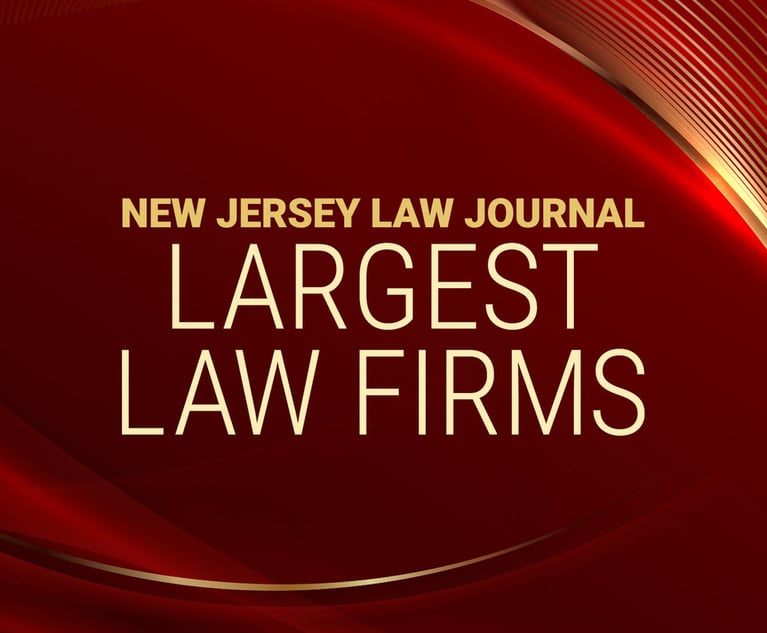 William "Bill" Baroni, former deputy executive director of the Port Authority of New York & New Jersey. Photographer: Peter Foley/Bloomberg
William "Bill" Baroni, former deputy executive director of the Port Authority of New York & New Jersey. Photographer: Peter Foley/BloombergWith 'Bridgegate' Behind Him, William Baroni May Still Face Ethics Probe in Bid to Practice Law Again
While the justices found he didn't commit a felony, lawyers say that doesn't mean he can't face professional sanctions.
May 11, 2020 at 05:57 PM
6 minute read
A former Chris Christie aide seeking to be reinstated to practice by the bar after the U.S. Supreme Court overturned his criminal conviction last week may not have a clear-cut path back into the legal profession.
William Baroni Jr. has requested reinstatement in New Jersey, New York and the District of Columbia since his criminal conviction for wire fraud and fraud on a federally funded program was nixed.
New Jersey's Office of Attorney Ethics said it will not oppose Baroni's bid to vacate an order suspending him from practice. The District of Columbia Court of Appeals vacated Baroni's interim suspension there on Friday.
Whether he will actually be allowed to return to the practice of law could be seen as a final referendum on the Bridgegate episode and New Jersey's willingness to move on from the scandal.
Some lawyers who handle attorney ethics cases expect that an investigation and ethics charges for Baroni's role in the Bridgegate case are forthcoming. Baroni was the deputy executive director of the Port Authority of New York & New Jersey when he helped orchestrate a scheme to cause traffic jams as political retribution for a mayor who did not endorse then-Gov. Chris Christie's reelection campaign.
"The mere fact that the criminal conviction was overturned would not end the analysis for these purposes," said Roger Plawker, an attorney at Pashman Stein Walder Hayden in Hackensack who represents attorneys in disciplinary cases. "The disciplinary authorities will still consider the nature of his conduct. His involvement in the traffic scheme is undisputed. Nobody believes it was appropriate conduct.
"Somebody that has engaged in conduct that, even if it is ultimately determined not to be criminal, but was certainly contrary to the public trust, is going to be looked at on the attorney disciplinary level, to ensure that public confidence in the bar be maintained," Plawker said. "The fact that he was a public official and abused a position of public trust makes the conduct more serious than if he had engaged in some sort of conduct in a strictly private context."
The suspensions were entered just after Baroni was sentenced in 2017 to 24 months in prison in the politically motivated lane closure scandal. Baroni's sentence was later reduced to 18 months when the U.S. Court of Appeals for the Third Circuit partially vacated his conviction. He served three months before he was granted bail in light of the Supreme Court's decision to hear the case.
Stephen Orlofsky of Blank Rome, who represents Baroni, said his client's applications for reinstatement are "an effort to begin the process of rehabilitation and to integrate him back into society." Orlofsky declined to comment on whether further ethics proceedings are in the offing.
The Supreme Court's unanimous ruling, written by Justice Elena Kagan, stopped short of completely exonerating Baroni and co-defendant Bridget Anne Kelly. "The evidence the jury heard no doubt shows wrongdoing—deception, corruption, abuse of power. But the federal fraud statutes at issue do not criminalize all such conduct," Kagan wrote.
Michael Ambrosio, who teaches professional responsibility at Seton Hall University School of Law, thinks that Baroni's years of "suffering" as his case unfolded could eliminate the need for disciplinary sanctions.
"I'm terribly sympathetic to his case in terms of his travails, having to contend with criminal charges for conduct that was in the realm of political maneuvering," said Ambrosio. "Not that I applaud what he did, but arguably his conduct was not, per se, wrong."
According to Ambrosio, the Office of Attorney Ethics and the Supreme Court are likely to take note of Baroni's otherwise-unblemished career and will view the Bridgegate episode as an aberration.
"What he did was an isolated action, as opposed to a pattern and practice, and it was in the context of political decision-making. It's an open question, the degree of wrongfulness that attaches to his conduct," Ambrosio said.
The fact that the Supreme Court dismissed the criminal case against Baroni may carry some weight, but he still has to account for his behavior, including his repeated misrepresentations that the lane closures were part of a traffic study, said Marc Garfinkle, a Morristown attorney who handles attorney ethics cases.
The Office of Attorney Ethics knows enough about the case that "they really have to pursue it, because above everything else, they're largely a consumer protection organization. They act to protect the public, and they may not think the public is comfortable with a technical dismissal by the Supreme Court," said Garfinkle.
Garfinkle thinks Baroni is likely to receive a suspension for his actions in the Bridgegate case. It won't matter to ethics investigators that Baroni's conduct in the Bridgegate case was not in the course of practicing law, Garfinkel added.
Baroni "was aware that it was a politically motivated ruse," Garfinkle said. "He allowed a public calamity to happen in order to gain a political advantage of some sort for himself. He was looking to create a problem because that would find him favor in someone else's eyes. I think [ethics authorities] will look at that and say that's not what we're supposed to do."
Garfinkle said the Supreme Court's Committee on Character could be an even greater problem for Baroni than any disciplinary sanctions he might face. Before he is readmitted, he may be required to undergo a Committee on Character review of the events in question, and await a determination about whether his present character is fit to practice law, said Garfinkle.
Baroni "will have an uphill battle in that forum," Garfinkle said.
This content has been archived. It is available through our partners, LexisNexis® and Bloomberg Law.
To view this content, please continue to their sites.
Not a Lexis Subscriber?
Subscribe Now
Not a Bloomberg Law Subscriber?
Subscribe Now
NOT FOR REPRINT
© 2024 ALM Global, LLC, All Rights Reserved. Request academic re-use from www.copyright.com. All other uses, submit a request to [email protected]. For more information visit Asset & Logo Licensing.
You Might Like
View All
$113K Sanction Award to Law Firm at Stake: NJ Supreme Court Will Consider 'Unsettled Law' Frivolous Litigation Question
4 minute read
Which Outside Law Firms Are Irreplaceable, and Which Should Have Gotten the Ax Years Ago?
4 minute read
Largest Law Firms: New Jersey and Firmwide Attorney Count

Law Firms Mentioned
Trending Stories
- 1Legal Events for Georgia Lawyers
- 2'There is No Time to Waste': Matt Gaetz Withdraws From AG Nomination
- 3The Growing PFAS Morass: Why Insurance Should Cover These Products Liability Claims
- 4Dallas Jury Awards $98.65M in Botham Jean Killing by Dallas Officer
- 5In Talc Bankruptcy, Andy Birchfield Skipped His Deposition. Could He Face Sanctions?
Who Got The Work
Michael G. Bongiorno, Andrew Scott Dulberg and Elizabeth E. Driscoll from Wilmer Cutler Pickering Hale and Dorr have stepped in to represent Symbotic Inc., an A.I.-enabled technology platform that focuses on increasing supply chain efficiency, and other defendants in a pending shareholder derivative lawsuit. The case, filed Oct. 2 in Massachusetts District Court by the Brown Law Firm on behalf of Stephen Austen, accuses certain officers and directors of misleading investors in regard to Symbotic's potential for margin growth by failing to disclose that the company was not equipped to timely deploy its systems or manage expenses through project delays. The case, assigned to U.S. District Judge Nathaniel M. Gorton, is 1:24-cv-12522, Austen v. Cohen et al.
Who Got The Work
Edmund Polubinski and Marie Killmond of Davis Polk & Wardwell have entered appearances for data platform software development company MongoDB and other defendants in a pending shareholder derivative lawsuit. The action, filed Oct. 7 in New York Southern District Court by the Brown Law Firm, accuses the company's directors and/or officers of falsely expressing confidence in the company’s restructuring of its sales incentive plan and downplaying the severity of decreases in its upfront commitments. The case is 1:24-cv-07594, Roy v. Ittycheria et al.
Who Got The Work
Amy O. Bruchs and Kurt F. Ellison of Michael Best & Friedrich have entered appearances for Epic Systems Corp. in a pending employment discrimination lawsuit. The suit was filed Sept. 7 in Wisconsin Western District Court by Levine Eisberner LLC and Siri & Glimstad on behalf of a project manager who claims that he was wrongfully terminated after applying for a religious exemption to the defendant's COVID-19 vaccine mandate. The case, assigned to U.S. Magistrate Judge Anita Marie Boor, is 3:24-cv-00630, Secker, Nathan v. Epic Systems Corporation.
Who Got The Work
David X. Sullivan, Thomas J. Finn and Gregory A. Hall from McCarter & English have entered appearances for Sunrun Installation Services in a pending civil rights lawsuit. The complaint was filed Sept. 4 in Connecticut District Court by attorney Robert M. Berke on behalf of former employee George Edward Steins, who was arrested and charged with employing an unregistered home improvement salesperson. The complaint alleges that had Sunrun informed the Connecticut Department of Consumer Protection that the plaintiff's employment had ended in 2017 and that he no longer held Sunrun's home improvement contractor license, he would not have been hit with charges, which were dismissed in May 2024. The case, assigned to U.S. District Judge Jeffrey A. Meyer, is 3:24-cv-01423, Steins v. Sunrun, Inc. et al.
Who Got The Work
Greenberg Traurig shareholder Joshua L. Raskin has entered an appearance for boohoo.com UK Ltd. in a pending patent infringement lawsuit. The suit, filed Sept. 3 in Texas Eastern District Court by Rozier Hardt McDonough on behalf of Alto Dynamics, asserts five patents related to an online shopping platform. The case, assigned to U.S. District Judge Rodney Gilstrap, is 2:24-cv-00719, Alto Dynamics, LLC v. boohoo.com UK Limited.
Featured Firms
Law Offices of Gary Martin Hays & Associates, P.C.
(470) 294-1674
Law Offices of Mark E. Salomone
(857) 444-6468
Smith & Hassler
(713) 739-1250






